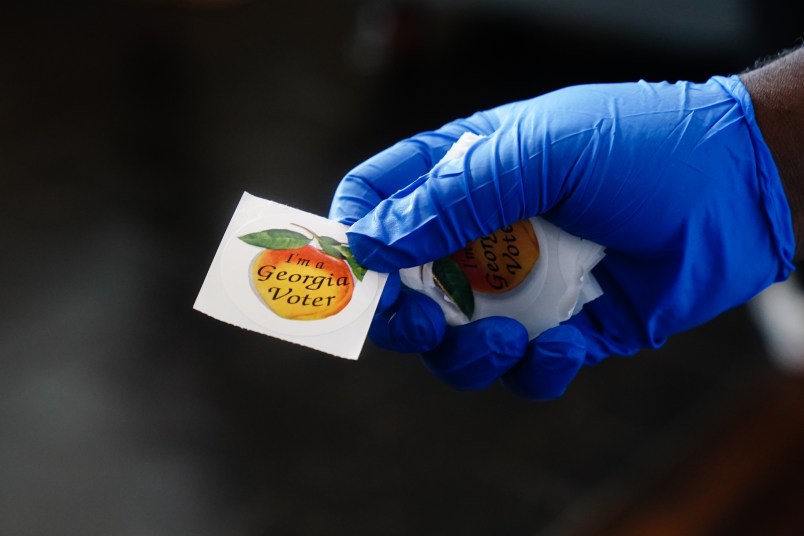A bill that would end no-excuse absentee voting in Georgia survived a key procedural step, with the Georgia Senate voting to advance the omnibus election legislation.
Among the dozens of states that have looked to make voting harder after the historic turnout in the 2020 election, Georgia has become a flashpoint. It was a focus of President Trump’s lies about the election, after he lost the state to Joe Biden. Democrats also won two U.S. Senate seats, giving them full control of Congress, in January run-offs, and now state Republican lawmakers are working to dismantle many of the state’s election procedures, including those that the GOP previously supported, like mail-in voting.
Monday was a key deadline in Georgia’s legislative process for bills to have made it out of at least one chamber of the legislature. Had the Senate not advanced the restrictive voting measure Monday, it would have had to take more complicated procedural moves to keep the legislation alive.
The state Senate voted 29-20 to approve the legislation, after the chamber’s Democrats dragged out the floor debate over the legislation for several hours.
“This is about the suppressing the vote of a certain group of people, especially me and people who look like me, and I take it personally,” Sen. Gail Davenport, a Black Democratic lawmaker, said on the floor.
Under the bill advanced by the Senate, Georgians can only vote absentee if they fit into a handful of categories: they’re 65 or older, physically disabled, are observing a religious holiday on Election Day, have a work conflict, or another reason requiring them to be absent on Election Day.
To justify ending no-excuse absentee ballots — an expansion that was put in place by state Republicans in 2005 — state Senate Majority Leader Mike Dugan claimed that the recent increase in mail in voting had increased the “burden” on election officials and the “cost.”
The legislation also changes the verification process for absentee voting: the bill adds new ID requirements, and includes an ID requirement for the application step as well. The bill adds a witness requirement for most absentee ballots and mandates that disclaimers are put on the mail ballot applications that are sent by non-government groups.
The legislation targets other gripes from Trump and his allies about the 2020 election. It restricts Georgia election officials’ ability to reach consent decrees in court cases challenging election practices — a provision that harkens back to Trump’s complaint about a consent decree Secretary of State Brad Raffensperger (R) reached to give voters more of an opportunity to fix signature issues on ballots. The measure also takes aim at the portable polling place that was used in Fulton County — which contains much of Atlanta — last year. Under the bill, local election officials will face new requirements for how they count ballots, while mandating daily public reports on the number of ballots issued, received and rejected.
Secretary of State Raffensperger, who was the recipient of much of Trump’s post-election ire, has avoided weighing in on most of the details of this and other pieces of election legislation being considered by the statehouse.
Other top Georgia Republicans have signaled their discomfort with the legislation.
The Georgia Senate is now debating sweeping elections restrictions. Lt. Gov. @GeoffDuncanGA is intentionally not on the floor — he refuses to be the presiding officer on a measure he opposes. #gapol pic.twitter.com/ql9DjXxA9v
— Greg Bluestein (@bluestein) March 8, 2021
Now that the bill has been passed by the state Senate, the legislation heads to the Georgia House for approval.



